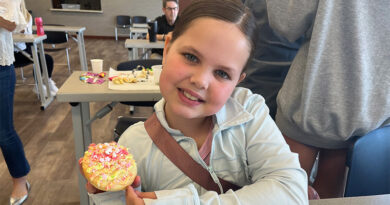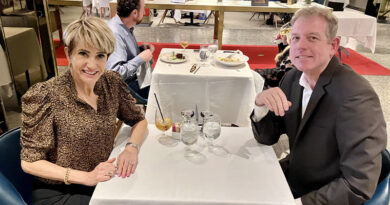UP Doctor Serves Up Healthcare at the Olympic Level
 Many may only dream of traveling to Rio de Janeiro to experience the summer Olympics, but for University Park residents Drs. Jeff and Sally Goudreau that journey will be a reality.
Many may only dream of traveling to Rio de Janeiro to experience the summer Olympics, but for University Park residents Drs. Jeff and Sally Goudreau that journey will be a reality.
The internal medicine specialist, accompanied by his wife, will travel to Brazil as a physician for the U.S. Olympic committee, serving the male and female swimming and water polo teams.
But this isn’t Goudreau’s first time working with the committee. The process started in 1990, when he was a resident at Presbyterian Hospital of Dallas, and happened upon an article seeking physicians for various U.S. Olympic teams. He applied on a whim, and completely forgot about it until the committee contacted him a decade later. In 2000, the doctor was invited to travel to an Olympic training center in San Diego for a month.
“They want you to come to their training center … where you spend a month living in their facility,” Goudreau said. “They want to see if you can mesh with [them].”
In 2001, Goudreau was sent to Japan with the U.S. basketball team for the World Championship for Young Men, a tournament for players under the age of 21. Two years later, he went to South Korea.
“If they like you they keep inviting you back,” he said.
The committee reached out to Goudreau again two years ago to inquire if he wanted to return to the Olympic healthcare game. Following another month-long stint at a training center in Colorado Springs, he returned to Dallas.
Not long after, the U.S. women’s national water polo team came into Louisville, and Goudreau was called in for duty.
“One of the girls was hit in the face. Blood everywhere, busted nose … they had general practice questions and I helped with that,” he recalled.
Maggie Steffens, a 23-year-old utility player for the team, considers Goudreau a great help and support system.
“He even gave one of our girls stitches mid-game with total calm and ease, and she was back in the water the next quarter,” she said. “It takes a special person to make us all feel so comfortable under extreme conditions like that.”
But according to Goudreau, being a physician at the Olympics isn’t a paid gig. Committee-appointed doctors work on a volunteer basis, although their airfare and accommodations are typically provided.
“He does this out of the goodness of his heart,” Sally said of her husband. “He isn’t in his practice when he’s there, and it’s an altruistic type thing.”
While the physician is there to fill prescriptions and treat anything from rashes to diarrhea, Goudreau insists the real heroes are the team trainers.
“You can sew them up, but the trainer is the most important person on the team. It’s usually [them] with the team,” he said. “They have bandages, a sewing kit … they do all the work and just rely on the doctors for the things they need outside their skill set. They are a thankless bunch.”
Rather than document his trips with just photos, Goudreau creates pastel and watercolor artwork in a journal; each image depicts sights from a different location since he started his Olympic travels.
“Anybody can take a picture,” he said. “I think [Rio] might complete this journal I’ve had since 2000.”








